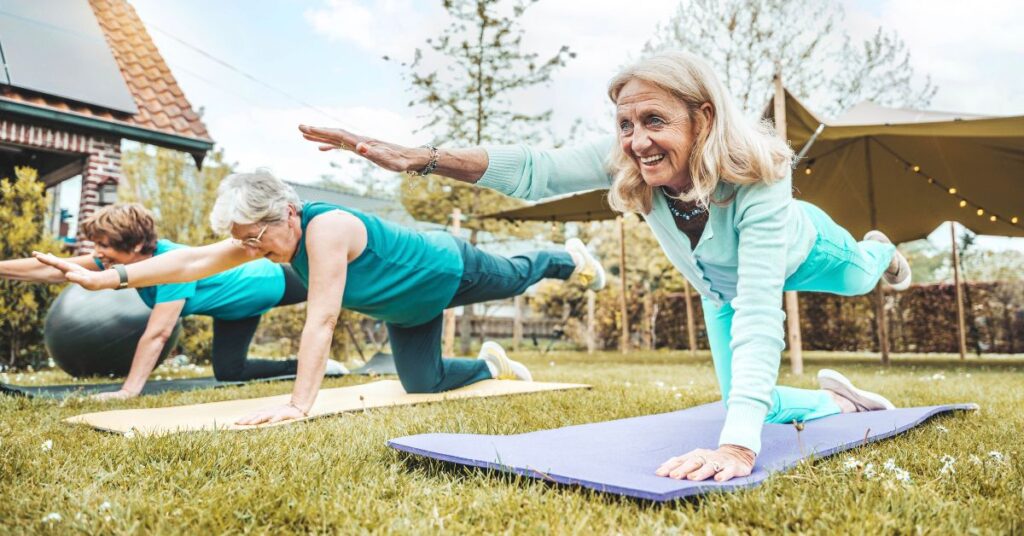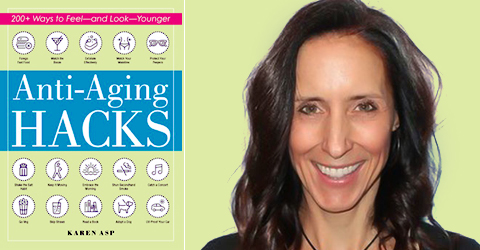

We know how important it is to stay active later in life. Exercise improves brain function, maintains muscle mass, and helps manage stress. Yet, women over fifty often experience a decline in physical activity, and that is at a time in their lives when the most common reason given for not exercising, lack of time, is less often a factor. Some reasons older women give for not exercising include lack of energy, joint or muscle pain, and feeling uncomfortable about their bodies or weight. A change to a whole food, plant-based diet can address these issues and more. Here are seven ways a WFPB diet can help older women overcome obstacles to fitness.
1. Reduce medications, thereby eliminating related side effects.
Medications come with side effects that often affect a person’s energy level or motivation to participate in physical activity. Millions of older adults are on medications for diabetes, high blood pressure, and high cholesterol. Side effects associated with these drugs include fatigue, weight gain, dizziness, gastrointestinal distress, headaches, and difficulty sleeping, all of which could make exercise a chore. However, following a WFPB diet can eliminate these conditions, thereby eliminating the need for medications.
2. Lose weight, and gain confidence in your body image.
It’s a vicious cycle. We know exercising can lead to weight loss, but exercising can be embarrassing, intimidating, and physically uncomfortable for overweight individuals. The good news is that eliminating processed foods and animal products from your diet can facilitate weight loss and give you the jump-start to ramp up your activity level. Overall, people who abstain from eating processed foods and animal foods have a significantly lower BMI than those on the standard American diet. Once you begin to see results and feel better, you may feel more inspired to get fit.
3. Reduce aggravating menopause symptoms.
Women in menopause often experience numerous symptoms, including hot flashes, sleeplessness, night sweats, fatigue, mood swings, increased anxiety, urinary tract infections, bloating, dizziness, and weight gain, any of which may affect their motivation to exercise. Eliminating animal products from your diet may help. Studies on menopause symptoms and diet demonstrate that vegan and vegetarian women report fewer and less severe symptoms than omnivores. Furthermore, in countries where little to no animal fat is consumed, reports of menopause symptoms are lower than in countries that consume high quantities of animal products.

4. Reduce anxiety and depression.
Many women experience increased anxiety or depression as they age. Changes in mental health may be associated with menopause, boredom, loneliness, health issues, family matters, financial strains, bereavement, or drugs and alcohol. While regular exercise is arguably one of the best ways to combat anxiety and depression, people suffering from these debilitating conditions often find it difficult to engage in healthy activities. Fortunately, recent research shows that dietary changes can influence the chemical balance of neurotransmitters in the brain. A plant-based diet, high in anti-inflammatory antioxidants and phytochemicals, can decrease inflammation in the brain that leads to chemical imbalances, repair damage to brain cells, and increase the production of the neurotransmitters that make us feel happy and hopeful.
5. Improve sleep quality.
If you aren’t sleeping well, you won’t feel like hitting the gym in the morning. Getting good sleep is paramount to fitting fitness into your daily routine. A WFPB diet can help. The production of melatonin, a chemical that helps regulate our sleep patterns, drops off as we age, contributing to higher instances of sleeplessness in older women. Melatonin is produced in the brain, but it is also present in many plant foods, including goji berries, almonds, raspberries, tart cherries, tomatoes, flaxseed, and walnuts. Additionally, a diet high in fiber and low in saturated fat has been shown to lead to more time in deep, restorative sleep, and fewer sleep interruptions.
6. Reduce inflammation and associated pain.
Many older women suffer from arthritis, and while movement is recommended to ease joint pain and stiffness, pain can be a barrier to enjoying a fit lifestyle. We know that plant-based foods are generally anti-inflammatory and animal foods promote inflammation, so shifting to a plant-based diet is a great step towards reducing overall inflammation that may cause pain. When surveyed, arthritis sufferers report that certain foods aggravate their pain. The most common triggers reported are meat, dairy, eggs, chocolate, citrus fruits, wheat, nuts, and nightshade vegetables. Aside from arthritis pain, a plant-based diet has been shown to reduce recovery time after strenuous workouts and injuries, allowing for more consistency in one’s fitness routine and therefore better results.
7. Increased energy throughout the day.
How many times have you planned to exercise after work, only to feel so tired by mid-afternoon that you give up all hope and pledge to try again the next day? It may be your diet and not your workload. Animal protein and fat are harder for the digestive system to break down and can leave us feeling overly full, heavy, and bloated. Add in processed foods with refined carbohydrates and added sugars, and you get spikes and drops in blood sugar that leave you feeling like crawling under your desk and going to sleep. Many women on a whole food, plant-based diet report high energy levels throughout the day. Give it a try and see for yourself. A diet rich in complex carbohydrates such as fruits, vegetables, legumes, and whole grains, keeps your blood sugar consistent and provides the energy your muscles and brain thrive on. Plus, you’ll get better sleep at night and reduce inflammation, pain, anxiety, menopause symptoms, body weight, and medicinal side effects. Change your diet and knock down the barriers keeping you from achieving your fitness goals.
References
- https://www.pcrm.org/good-nutrition/nutrition-information/a-natural-approach-to-menopause
- https://www.ncbi.nlm.nih.gov/pubmed/29704911
- https://health.clevelandclinic.org/plant-based-menopause-treatments-can-help-sometimes/
- https://www.todaysdietitian.com/newarchives/040114p32.shtml
- https://www.sciencedaily.com/releases/2018/08/180820164248.htm
- https://www.ncbi.nlm.nih.gov/pmc/articles/PMC5466942/
- https://pmj.bmj.com/content/90/1059/26
- https://www.pcrm.org/good-nutrition/food-and-mood
- https://www.aagponline.org/index.php?src=gendocs&ref=anxiety
- http://www.vivo.colostate.edu/hbooks/pathphys/endocrine/otherendo/pineal.html
Copyright 2025 Center for Nutrition Studies. All rights reserved.
Deepen Your Knowledge With Our
Plant-Based Nutrition
Certificate
Plant-Based Nutrition Certificate
- 23,000+ students
- 100% online, learn at your own pace
- No prerequisites
- Continuing education credits



